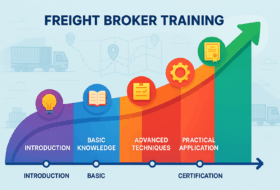Freight brokering is the backbone of the logistics industry, connecting shippers with carriers to keep goods moving across the globe. While it may seem like a straightforward job, the world of freight brokering is filled with fascinating quirks and surprising facts that make it a dynamic and exciting field.
Why Digital Freight Marketplaces Are Reshaping Logistics
Imagine booking a truckload shipment as easily as hailing a ride with your favorite app. That’s exactly what digital freight platforms are enabling. These online marketplaces connect shippers and carriers in real-time, using smart algorithms, mobile apps, and cloud-based systems to streamline the entire freight matching and booking process. It’s not just about convenience—it’s about creating a faster, more transparent, and efficient logistics ecosystem.
6 Key Benefits of Digital Freight Marketplaces
1. Real-Time Freight Matching
One of the most revolutionary features of digital freight platforms is real-time freight matching. Instead of spending hours calling carriers or emailing brokers, shippers can post a load and instantly get matched with a carrier based on proximity, availability, and rate preferences. Carriers, in turn, can fill empty miles and avoid costly deadhead trips.
2. Transparent Pricing
Traditional freight brokering often leaves shippers in the dark about pricing. Digital freight platforms introduce a new level of transparency with real-time pricing, allowing shippers to compare quotes instantly. This promotes fair competition, builds trust, and helps businesses better forecast their logistics spending.
3. End-to-End Visibility
Modern logistics demands visibility—and digital freight platforms deliver. Real-time tracking gives shippers up-to-the-minute updates on their shipments, while AI-powered analytics help predict delays and optimize routes. This level of insight is crucial for supply chain managers who need to keep operations smooth and responsive.
4. Enhanced Efficiency for Carriers
Carriers benefit immensely from digital freight too. These platforms help minimize downtime by automatically suggesting loads based on the driver’s location and preferences. Integrated features like e-documents, mobile proof of delivery, and instant payments also eliminate paperwork and reduce administrative hassles.
5. Data-Driven Decision Making
Data is at the heart of digital freight. From predictive analytics to rate benchmarking and capacity forecasting, platforms provide valuable insights that help both shippers and carriers make smarter decisions. Whether it’s optimizing delivery windows or evaluating carrier performance, data takes the guesswork out of logistics planning.
6. Scalability for Growing Businesses
Digital freight platforms are especially beneficial for small-to-medium businesses that may not have the resources of large supply chains. These marketplaces level the playing field by giving everyone access to the same tools, networks, and shipping options—allowing businesses to grow faster without being bottlenecked by logistics limitations.
The Digital Freight Revolution Is Just Beginning
Digital freight marketplaces are still in their early stages, but their impact is already significant. Companies like Uber Freight, Convoy, and Transfix are pushing the envelope with automation, AI, and seamless digital tools. As adoption spreads, traditional brokers and logistics providers are also integrating digital freight capabilities to remain competitive and agile.
Challenges to Watch
Of course, no transformation comes without hurdles. Digital freight platforms must contend with regulatory compliance, cybersecurity, and the challenge of maintaining human relationships in a tech-heavy process. Additionally, adoption among smaller, less tech-savvy carriers may lag behind. However, ongoing innovation and investment are helping bridge these gaps.
Conclusion:
The power of digital freight lies in its ability to simplify complex processes, foster transparency, and improve outcomes for all logistics stakeholders. As technology continues to evolve, these marketplaces will play an even greater role in shaping the future of global supply chains. Whether you’re a shipper looking for smarter solutions or a carrier trying to maximize efficiency, digital freight platforms offer the tools to thrive in a fast-moving world.
FAQ
Q: What is a digital freight marketplace?
A: A digital freight marketplace is an online platform that connects shippers and carriers in real-time, streamlining the freight booking, tracking, and management process using technology.
Q: How do digital freight platforms benefit shippers?
A: Shippers gain access to real-time pricing, end-to-end visibility, faster booking, and better route optimization through data and AI-powered tools.
Q: Is digital freight secure?
A: Yes, reputable platforms implement robust cybersecurity protocols and data encryption to protect users’ information and transactions.
Enroll Today and join thousands of students who’ve turned their dreams into reality.
Growth + Change = Opportunity! How are you going to capitalize on the opportunity as a freight broker, agent, dispatcher or box truck carrier?
Enroll in a course today and get a Shippers List for free! Use Code: freeship





